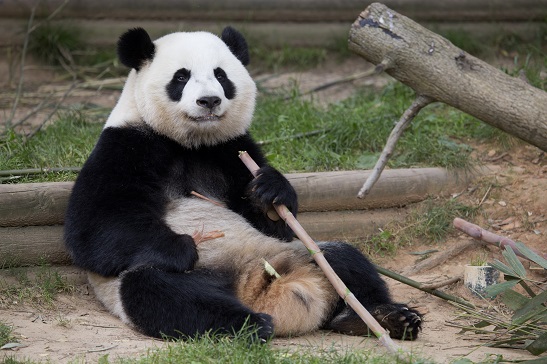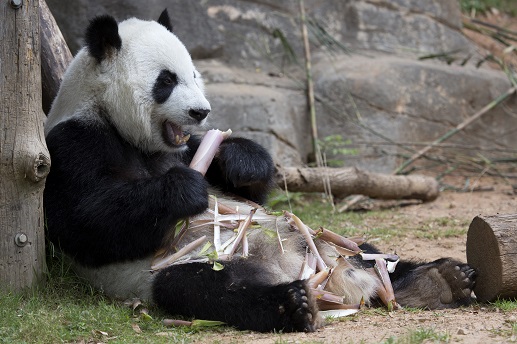Xi Lan & Po will leave Zoo Atlanta in the near future
Zoo Atlanta announced that Xi Lan & Po will leave their birthplace Zoo Atlanta in the near future and move to the Chengdu Research Base of Giant Panda Breeding. Both sub-adult males were expected to leave Atlanta on November 24, 2013 but their departure to China has been temporarily postponed. After reviewing the results of their pre-shipment physical examinations, the decision was made to reschedule the pandas’ journey for China.
Xi Lan and Po are healthy, but their journey will involve a long flight and a period of adjustment once they reach their new home. They’ll also become accustomed to a new diet which will include China’s native bamboo species, which are different from the ones native to our area in Georgia. The next few months will give Xi Lan and Po a bit more time to get ready for this transition.
Rebecca Snyder, PhD, Zoo Atlanta’s Curator of Mammals wrote this personal letter about the departure:
I wanted to take a brief detour from all things Mei Lun and Mei Huan to send our Cub Confidential family a personal note on two other giant pandas who are near and dear to us: the twins’ older brothers, Xi Lan and Po.
As most of you probably know, we’ll soon bid farewell to our “big boys” when they head off on November 24 to start the next chapter of their lives at the Chengdu Research Base of Giant Panda Breeding in China. I know you all know that watching giant pandas grow from tiny, helpless beings to adventurous cubs to handsome sub-adults is a journey full of precious milestones. While this is a bittersweet one, it’s a milestone too, and it’s one that should give us all great occasion for pride and hope.
We’ve known since these guys were born that they’d someday be leaving us to make their homes in China; this is actually true of the offspring of all giant pandas here in the U.S., not just at Zoo Atlanta. Because we become so invested in these animals’ lives and grow to love and appreciate them as we do, it’s easy for us to project human emotions onto their behaviors, feelings and motivations. When we do that, though, we potentially do this amazing species an unintended disservice. Unlike humans, which thrive on social interactions with others of our own species, giant pandas are solitary animals. With the exceptions of nursing cubs or breeding adults, they neither require nor seek companionship with other giant pandas. This means that at the ages of 5 and 3, Xi Lan and Po have both been ready for some time to start solitary lifestyles. The next natural step for them is to have the chance to interact with females and hopefully someday breed and become fathers themselves. So while this means a bittersweet goodbye for us, it’s a fantastic opportunity for them.
I’ve had many panda fans tell me that Xi Lan is a personal favorite of theirs. I’ve had others mention that Po was the cub who got them “hooked” on watching PandaCam. Having been here since the moments both were born, I share your feelings of warmth and pride in these two very special individuals.
Those of you who have followed us for a while know that this isn’t the first time we’ve said goodbye. Nearly four years ago, we bid bon voyage to Lun Lun’s and Yang Yang’s firstborn, Mei Lan, when he left for China. We still receive periodic updates on him from our colleagues at the Research Base, and I’ve had several panda fans tell me they’ve even had the opportunity to visit him in Chengdu. We can look forward to staying in touch with our friends in China about Xi Lan’s and Po’s progress as the Research Base gets ready to welcome two more members of our giant panda family.
Zoo Atlanta’s Deputy Director, Dwight Lawson, and I were in Chengdu last week for an international giant panda meeting. We talked with the Director and the Head Veterinarian of the Research Base about Xi Lan’s and Po’s arrival. They are looking forward to welcoming them to the Research Base. Mei Lan is a celebrity there and a staff favorite because he is a star pupil in training sessions. He is thriving at the Research Base, and I’m sure Xi Lan and Po will as well.
Our colleagues in Chengdu are some of the world’s foremost experts in the care and study of giant pandas, and they’ve devoted their careers to specializing in the unique needs and behaviors of this species. Those of you who grew to admire the dedication, expertise and special attentions of Deng Tao, our colleague who helped us with Mei Lun and Mei Huan until very recently, can rest assured that the Research Base is staffed by a team full of Deng Taos. Having visited and studied at the facility many times myself, I can tell you that it’s an amazing place where Xi Lan and Po will be in the finest of hands.
Lun Lun, Yang Yang, and their offspring are part of a global effort to conserve giant pandas. I have been participating in giant panda meetings in China since 1997. At the meeting I attended last week, I was struck by the tremendous progress that has been made in giant panda research and conservation. In 1997, there were approximately 130 captive giant pandas, and the population was not self-sustaining. Now there are 376 giant pandas in captivity. The population is flourishing and is expected to increase to 500 in just two years. In 1997, there was very little research being conducted on wild giant pandas. This year’s conference was almost entirely focused on research and conservation involving the wild population. The protected area for giant pandas has significantly expanded in the last 15 years, and results of studies on wild pandas are being published in highly regarded peer-reviewed journals. The results of the fourth national census of the wild population will be released early next year. The expectation is that those results will show that the wild population is stable and is possibly increasing. A subadult male panda was reintroduced to the wild in fall 2012. He is being closely monitored, and so far he is doing well. Seven more captive born giant pandas will be reintroduced to the wild in 2014. In short, the giant panda program is a success and I am hopeful that giant pandas will survive for many generations to come, not just in zoos but also in the wild.
Source: Zoo Atlanta











